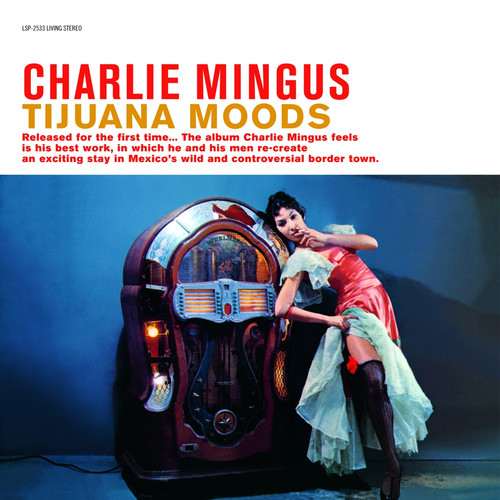"Oh Yeah" - Charles Mingus (p, voc); Booker Ervin (ts); Roland Kirk (fl, ts, siren, manzello, stritch); Jimmy Knepper (tb); Doug Watkins (b); Dannie Richmond (dr) Commenting on this album in 1962, Billboard magazine wrote: »He seems to be everywhere, everywhere that is but on his usual instrument«. Charles Mingus, one of the most impressive musicians in the history of jazz, doesn’t play a single note on the bass for a change, but leads the band from his (blues-)piano – the instrument that he always used for composing. He hits the keys, he sings the blues, he shouts and he encourages – apparently Mingus really found the need to express himself loudly in this album. (Doug Watkins stood in for him on the contrabass.) "Oh Yeah" is definitely Mingus’s most powerful and passionate album. He calls on two hot, intensive saxophonists – Roland Kirk and Booker Ervin – as well as Jimmy Knepper on the trombone. Kirk is the main soloist, but all three wind-players deliver expressive improvisations, carrying out a non-stop dialogue with one another, and pushing one other to achieve maximum energy. The music is wild and ecstatic, but it’s not free jazz, remaining – as it does – grounded in blues and gospel. "Hog Callin’ Blues" is an enthralling shuffle with a wealth of riffs, "Devil Woman" a clever slow blues with inventive wind figures. "Ecclusiastics", with its constant change of rhythm and expression alternating between gospel and blues has the most complex form. Blues has always been a part of a black church service, said Mingus. "Eat That Chicken" (a homage to Fats Waller and his favourite food) even plays around with an old-time, Dixie feeling. Humour is never far away. Even in the atomic bomb song (this too, a sort of churchy blues) one hears the words: »Don’t let ’em drop it! Stop it! Be-bop it!« This Speakers Corner LP was remastered using pure analogue components only, from the master tapes through to the cutting head. All royalties and mechanical rights have been paid. Recording: November 1961 at Atlantic Studios, New York City, by Tom Dowd and Phil Iehle Production: Nesuhi Ertegun
Von diesem Album hieß es im "Billboard" damals: »Er ist überall, nur nicht an seinem gewohnten Instrument.« Charles Mingus, einer der eindrucksvollsten Bassisten der Jazzgeschichte, spielt hier ausnahmsweise keinen Ton auf dem Bass, sondern leitet die Band vom (Blues-)Klavier aus – dem Instrument, an dem er immer auch komponierte. Er haut hier in die Tasten, er singt den Blues, er schreit und er feuert an – offenbar verspürte Mingus bei diesem Albumprojekt ein ganz besonderes Ausdrucksbedürfnis. (Doug Watkins vertritt ihn am Kontrabass.) "Oh Yeah" gehört in der Tat zu Mingus’ stärksten und leidenschaftlichsten Alben. Gleich zwei heiße, intensive Saxofonisten hat er dabei – Roland Kirk und Booker Ervin – sowie Jimmy Knepper an der Posaune. Kirk ist der Hauptsolist, aber alle drei Bläser liefern expressive Improvisationen, kommentieren einander ständig, steigern sich gegenseitig zum Energie-Maximum. Die Musik ist wild und ekstatisch, aber sie wird nicht Free Jazz, sondern bleibt geerdet in Blues und Gospel. "Hog Callin’ Blues" ist ein packender Shuffle mit vielen Riffs, "Devil Woman" ein cleverer Slow Blues mit originellen Bläserfiguren. Die komplexeste Form hat "Ecclusiastics" mit seinen ständigen Rhythmus- und Ausdruckswechseln zwischen Gospel und Blues. Der Blues sei immer schon ein Teil des schwarzen Gottesdiensts gewesen, meinte Mingus. "Eat That Chicken" (eine Hommage an Fats Wallers Lieblingsmahlzeit) spielt dann sogar mit Oldtime- und Dixie-Feeling. Überhaupt kommt der Humor nie zu kurz. Selbst im Atombomben-Song (auch der: eine Art Kirchenblues) heißt es: »Don’t let ’em drop it! Stop it! Be-bop it!« Diese Speakers Corner Produktion wurde unter Verwendung von analogem Masterband und Mastering 100% rein analog gefertigt. Alle Lizenzen und GEMA-Beiträge wurden abgeführt. Aufnahme: November 1961 in den Atlantic Studios, New York City, von Tom Dowd und Phil Iehle Produktion: Nesuhi Ertegun











